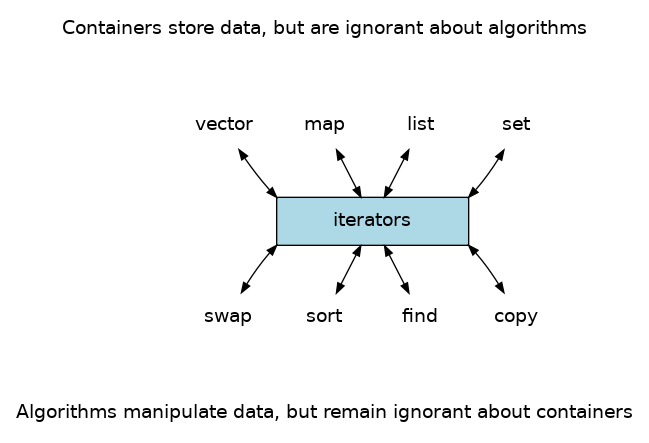17.2. Basic Model¶
One of the primary goals of the STL is avoiding repetition & using regular, compact syntax. The STL achieves these goals using separation of concerns.

Algorithms and containers interact through iterators.
17.2.1. Basic Model in Action: find()¶
Let’s suppose we need to find the first element in a container that equals a value. Specifically, we want to find a specific int in a vector.
This seems like a function we will need to use frequently, so we decide right away that it should be written as a free function:
We could choose to pass an entire container of a specific type to our find function.
std::vector<int>::iterator
find(std::vector<int>& v, int x) {
and loop over the entire container:
for(auto p = v.begin(); p != v.end(); ++p) {
if (x == *p) return p;
}
See this example running step-by-step
While this seems easier at first, this version is not nearly as generic, or general purpose as a version that defines a generic type and uses iterators.
No way to run this function over part of a container.
Need a different function for every container type.
How do we refactor our find function to satisfy our goals?
Replace
vector<int> vwith a pair of iteratorsMake the iterators generic types
Make the value type generic
#include <vector>
// function to find 'x' between first and last
template<class InputIt, class T>
// requires: InputIt is Convertible to T when dereferenced
// && InputIt is EqualityComparable
// && T is Regular
InputIt my_find(InputIt first, InputIt last, const T& value)
{
for (; first != last; ++first) {
if (*first == value) {
return first;
And we can prove to ourselves that we get the same results as find.
And since it is arguably the same function as std::find,
we now know we no longer need it.
Try this!
Change the name of the function my_find to find and change
the matching name on line 24.
Does this program still compile? Explain.
Rewrite the previous example to use find.
More to Explore
From cppreference.com
Overview of the algorithms library.
std::find (and find_if).